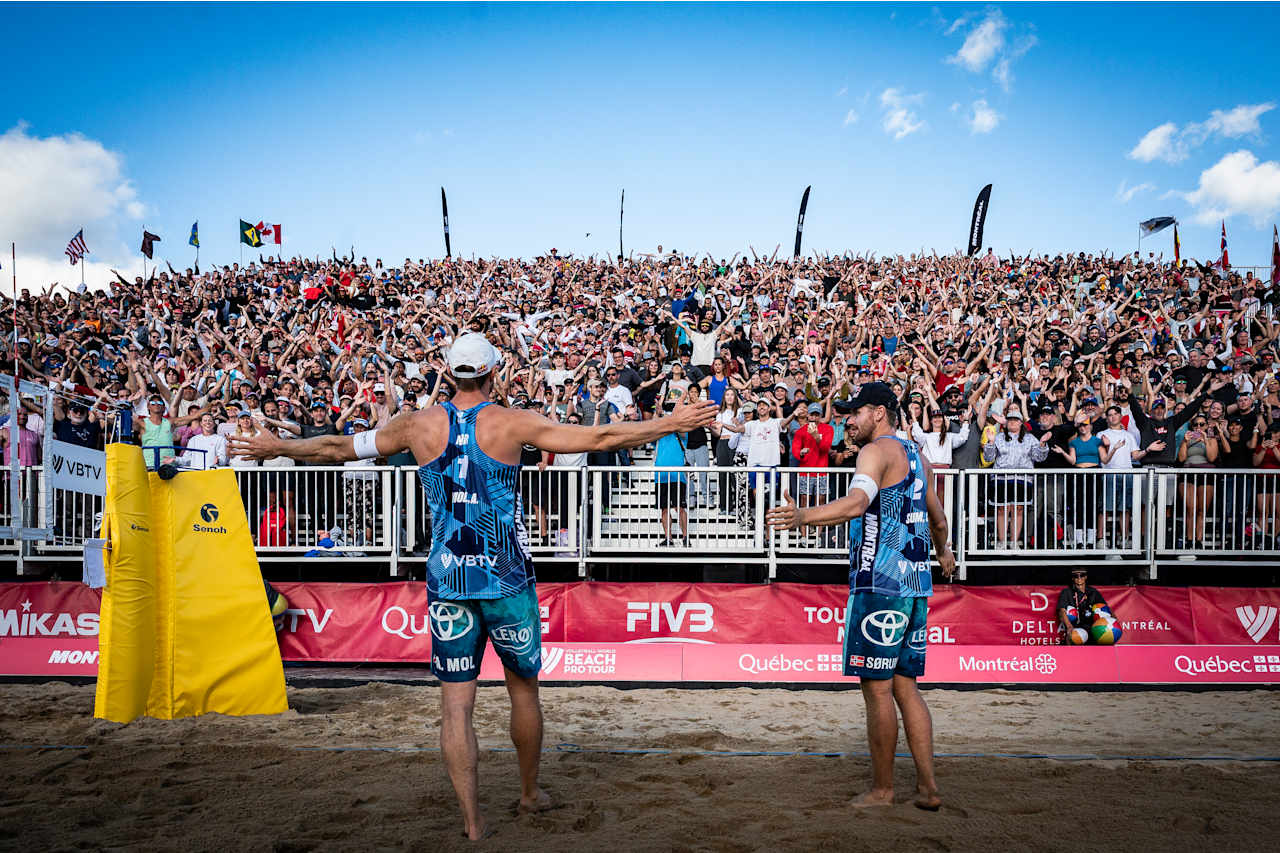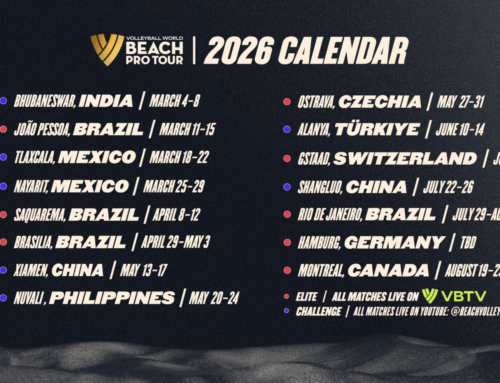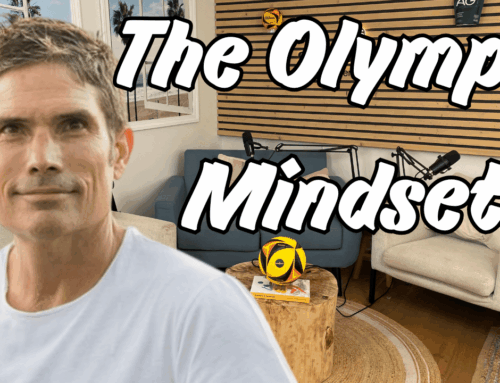MONTREAL, CANADA – When Melissa Humana-Paredes and Brandie Wilkerson stepped onto the court on Thursday evening for their first pool play match of the Montreal Elite, 3,000 strong Canadian faithful, red and white maple leaf flags waving, gave their top team a hearty ovation. They stood, clapped, whistled, cheered.
And then they stood, clapped whistled, cheered.
And stood some more, clapped some more, whistled some more, cheered until it’s a wonder anyone had a voice left on the island.
For 15 full minutes, not a seat was had, and not a single fan halted in pouring out their appreciation. A goosebump-inducing entrance fit for a king.
In this case, queen. Multiple of them.
This week’s Elite was Humana-Paredes’ and Wilkerson’s first competition on home soil since winning the Olympic silver medal in Paris last summer, the first Olympic medal to come home to Canada since Mark Heese and John Child won bronze in the inaugural Games in 1996.
Always wildly popular not just in Canada but all around the world on the Beach Pro Tour, Humana-Paredes and Wilkerson have entered a new stratosphere of celebrity in Canada. Their night matches caused traffic jams on a daily basis, fans lining up past the entrance after the final ball had dropped to get a picture and autograph with Humana-Paredes and Wilkerson. They posed for every one, thousand-watt smiles permanently etched onto their faces, signed until their fingers ached. Initially with a capacity for 3,000, center court was expanded to fit another 300. When that sold out, another 300 were added, to the point that there would be no sense in adding more, for the jumbotron would be blocking their view.
They repaid their faithful in kind, storming through the field, playing their finest beach volleyball of the calendar year and, perhaps, the finest of their three-year partnership. Six opponents matched up with Humana-Paredes and Wilkerson this week; six opponents fell, Cinja Tillmann and Svenja Muller being the final of the bunch as a Wilkerson block sealed their first gold medal as a team since Montreal of 2023.
“Montreal we did it!” Humana-Paredes yelled into the mic, turning to the crowd. “You guys helped a bit.”
Thursday through Sunday was the perfect confluence of factors for the Canadians, one not seen since their remarkable playoff run through the Paris Olympic Games. Wilkerson led the tournament in blocks per match (4.83) by nearly a full two blocks over No. 2 Tina Graudina. Humana-Paredes’ 13.33 digs per match led runner-up Anna-Lena Grune by more than two. Their 21-10, 21-19 quarterfinal win over Brazilians Thamela Coradello and Victoria Lopes was the most dominant of that round, and the most lopsided loss ever handed to the world No. 1. Their 21-11, 22-20 victory over Paris gold medalists Ana Patricia Silva and Duda Lisboa was likewise the most lopsided of that round. The 21-15, 22-20 sweep over Tillmann and Muller marked just the second sweep of the season for Germany.
“Our team has put a lot of work in this first half of the season, our defense being the strength of that,” Humana-Paredes said.
It showed, in every aspect in Montreal this weekend.
“This is every athlete’s dream come true to come on the court and feel so much love and support,” Wilkerson said. “Let’s go Canada. We did this.”

Volleyball World photo
Anders Mol, Christian Sorum repeat in Montreal
Melissa Humana-Paredes and Brandie Wilkerson were not the only repeat champs in Montreal this weekend. Anders Mol and Christian Sorum, fresh off a fifth European Championship victory, also successfully defended their title here in 2023, bouncing back from a somewhat apathetic pool play start to blow out the field in three straight playoff sweeps.
After going three in each of their pool play matches – wins over Marco Grimalt and Esteban Grimalt, and Marco Krattiger and Leo Dillier, and a thrilling loss to Nicolas Capogrosso and Tomas Capogrosso – Mol and Sorum played their way back into the kingly form with which we’ve become so familiar these past seven years.
Germans Paul Henning and Lui Wust played a fine match against Mol and Sorum in the quarterfinals – and still lost, 21-16, 21-15.
The Czech Republic’s Ondrej Perusic and David Schweiner, the 2023 World Champs and a pair that had gone three sets with Norway in six consecutive matches, bowed out with minimal resistance in the semifinals, 21-14, 21-18. Sweden’s white-hot new pairing of Jacob Holting-Nilsson and Elmer Andersson, in their third straight final, could do little to halt, or even slow, the momentum, dropping 21-19, 21-13.
Only once in the last two years, at the Beach Pro Tour Finals in Doha in December, have Mol and Sorum made a clean sweep of the playoffs, much less outscoring those opponents by a whopping 31 points in three matches.
“We love our job,” Mol said. “Moments like this are what we live for. This is why we play the sport and love it so much.”

Volleyball World photo
Other news and notes from the Montreal Elite
Ana Patricia, Duda, return to Beach Pro Tour in joyful fashion
It is wonderful to see Ana Patricia Silva and Duda Lisboa back on the sand.
After winning gold at the Paris Olympic Games, the first Brazilian team to do so since 1996, before either of them were even born, they entered the 2025 season justifiably slow. They took ninth in Mexico, fifth in Saquarema, third in Brasilia. It looked heavy. All of it. Duda acknowledged as much on Instagram, writing: Y’all comment on my body, my performance, everything. But they forget something that is most important: mental health. Taking care of my mental health has been a priority. This past year has not been easy! The post-Olympic period is challenging, and few talk about it. Even more so when some people walk over others. Before you come here to talk, remember that there is a human being behind all of this. Because in the end of it all shall pass… and what really matters is my life, my home, my peace. As much as it hurts to go through all this.. I need to take care of me before anything.
They took four months off, allowing injuries, both mental and physical, to heal. Throughout the week in Montreal, they appeared rejuvenated, not just in their physical play, which was tremendous, but with how they played. They looked joyful, like kids. They swam in the basin, cracked jokes, smiled and laughed on the court. They were bright-eyed youngsters again, still very much in their prime. Oftentimes bronze medals were met with a shrug.
This one, won over Tina Graudina and Anastasija Samoilova, was met with a genuine happiness that was so good to see.
“I’m so happy with this medal,” Duda said. “Last week I came here to talk about a very difficult subject, with so many people questioning our high performance, and today I’m here celebrating an incredible achievement. Life really is a whirlwind of emotions. Every day is a new chance to learn, enjoy, and continue to our dreams. Heartfelt thanks to everyone who is part of this journey. My gratitude is immense.”
Young Sweden’s Jacob Holting-Nilsson and Elmer Andersson are here to stay
Any team at this level can get hot on any given weekend. It was fair to wonder, then, after the Gstaad Elite, if Elmer Andersson and Jacob Holting-Nilsson had staying power on the Beach Pro Tour, or if their stunning run to the finals was just a talented team getting hot on a random weekend in July.
Staying power indeed.
Holting-Nilsson and Andersson followed up on their silver medal in Switzerland with a gold at the Baden Challenge and another silver here in Montreal. They stunned their own countrymen, David Ahman and Jonatan Hellvig, in the semifinals, marking the first time the younger Sweden has beaten the elder.
“It’s super tough, such a strong team,” Christian Sorum said of now having to worry about not one, but two Swedish teams. “They have a bright future. Sweden’s doing such a good job. The future looks dangerous for Sweden.”


